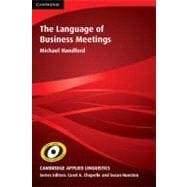
| Series editors' preface | |
| Acknowledgements | |
| Transcription conventions | |
| CANBEC: corpus and context | |
| Data collection | |
| Corpus constituency | |
| Contextual information | |
| Transcription and anonymization | |
| Corpus size and generalizability | |
| Outline of the book | |
| References | |
| Background: theory and methodology | |
| Theory | |
| Methodology | |
| Summary | |
| References | |
| The business-meeting genre: stages and practices | |
| Applying Bhatia's multi-perspective model of discourse to business meetings | |
| The meeting matrix | |
| Applying the meeting matrix | |
| Summary | |
| References | |
| Significant meeting words: keywords and concordances | |
| Institutional language and everyday English | |
| Lexico-grammatical theoretical considerations | |
| Word frequencies | |
| Keywords | |
| Summary | |
| References | |
| Discourse marking and interaction: clusters and practices | |
| Defining clusters | |
| Clusters in business research | |
| Cluster lists | |
| Categorization of clusters | |
| Clusters in context | |
| Summary | |
| References | |
| Interpersonal language: pronouns, backchannels, vague language, hedges and deontic modality | |
| The transactional/relational linguistic distinction | |
| Pronouns | |
| Backchannels | |
| Vague language | |
| Hedges | |
| Deontic modality | |
| Summary | |
| References | |
| Interpersonal creativity: problem, issue, if, and metaphors and idioms | |
| Problem and issue | |
| If | |
| Metaphors and idioms | |
| Summary | |
| References | |
| Turn-taking: power and constraint | |
| Turn-taking in internal meetings | |
| Turn-taking in external meetings | |
| Summary | |
| References | |
| Teaching and learning implications | |
| Who is the learner? | |
| Teaching materials: what do they teach? | |
| How can a corpus such as CANBEC be exploited? | |
| Summary | |
| References | |
| Appendix | |
| Index | |
| Table of Contents provided by Publisher. All Rights Reserved. |
The New copy of this book will include any supplemental materials advertised. Please check the title of the book to determine if it should include any access cards, study guides, lab manuals, CDs, etc.
The Used, Rental and eBook copies of this book are not guaranteed to include any supplemental materials. Typically, only the book itself is included. This is true even if the title states it includes any access cards, study guides, lab manuals, CDs, etc.